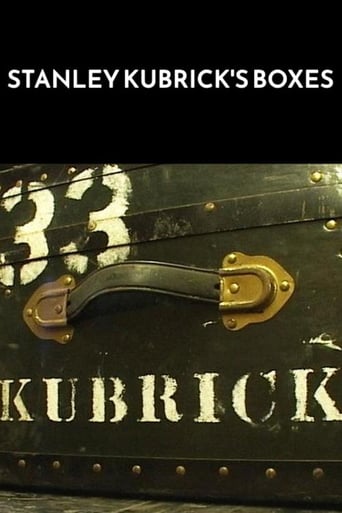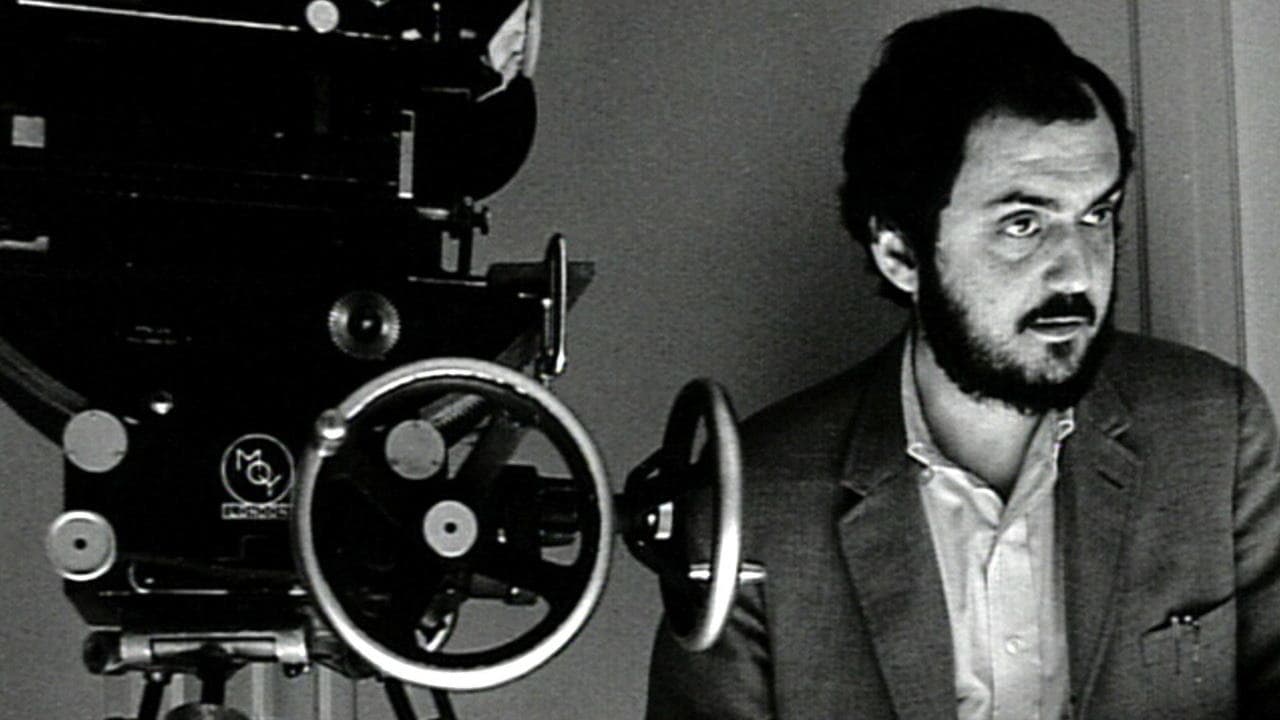Joshua Warren
To be quite honest, and I say this as a major Kubrick fan, hoping to direct films myself one day, that I learned more about the man from this one documentary than I have any other. It is short, yes, but it describes the genius and eccentricity of Kubrick so well.I really can understand Jon Ronson when he says he was privileged by the experience, going through the so called "kubrick boxes" getting an incredible insight in Kubrick's mind. Also I was relieved when they in the end said that the boxes where now stored in a London film school for preservation and educational purposes.There really isn't anything wrong about this documentary, other than Jon Ronson's bad habit of giving some rather silly and stupid movie references in the middle of interviews and as I said earlier, it was a little short. If Jon Ronson ever decided to make a longer cut of this documentary, I would love too see it.
MisterWhiplash
When a man who was as smart - not entirely nuts, there's something of a difference when looking at an artist - as Stanley Kubrick made a film, it became like erecting a skyscraper: lots and lots of planning, researching, more researching, writing and re-writing, very long casting sessions, long (definitively Kubrickian long) shoots, editing, and finally, more often than not, perfect film-making. For those who may on a given day say out loud that Stanley Kubrick is the greatest filmmaker post-silent era (which I myself have uttered on occasion), a documentary like Stanley Kubrick's boxes realizes on this man's obsessions and passions and curiosities and singular attention to detail that it also revealed a tragic flaw: in a career that spanned over 40 years, he directed only 13 feature length films, and in the last 30 years of his life directed 4. One of the things that will endlessly interest me is how a man had such a wealth of knowledge about one thing that if it got turned off or something happened with the project it was like literally losing a child. And, oddly enough for such a (compared to, say, Woody Allen) un-prolific man, he never went on "holiday" or even really recognized what it was to take a holiday.This documentary is essential if only for highlighting this and other parts to Kubrick, the actual man as he was as well as the "mythology" that surrounded him for being so reportedly reclusive and eccentric (the opposite was really the case, as a married man with a bunch of kids and cats and dogs who merely enjoyed privacy and creative independence as earned luxuries), with the aid of so many boxes full of "stuff" that it took the director 4 years to look through it all. As meticulous as he was in his everyday life, so was he in storing everything. We see the stills of various hats tried on for Clockwork Orange. We see the legal paperwork Kubrick fired out over a mid-70s sci-fi show that ripped off 2001. We see a handful of the hundreds of hours of audition footage of the grunts for Full Metal Jacket. Hell, we even get to see one or two "looney" videos from pranksters-cum-stalkers who sent Kubrick videos parodying his films.We also get some touching and funny anecdotes from his family (wife and kids) and those closest to him like his assistants (Leon Vitali has some particularly good ones), all unearthing stories to go along with what's pulled out. Some of it, indeed, comes close to unbelievable. But at the same time it can range from insightful without having anything to do with movies (i.e. long transcripts about how to deal with feline behavior) and the mountains of research dedicated to Napoleon and Louis Begley's Wartime Lies. The real hardcore Kubrick fans might not find a whole lot to look at- not sure who they are as I'm possibly one and didn't bicker much- but everyone else, even casual fans, would do very well to seek this out (it's finally aired in the US on Sundance channel). At the least, we get some stuff for film-buffs to geek out on like super-duper rare behind the scenes footage with FMJ.
frankenbenz
http://eattheblinds.blogspot.com/The day Stanley Kubrick died I was terribly saddened. My grief was for a very selfish reason, simply that I would see only one new Kubrick film for the rest of my life. That film was Eyes Wide Shut and it proved to become one of my favorite Kubrick films. But losing Kubrick too early was a tragedy, not just because it would push A.I. onto Spielberg's desk, but because Kubrick still had a few films left in him and those films, would undoubtedly be masterpieces. Masterpieces are fewer and further between now more than ever and if the current state of film-making is any indication, there will never be another Kubrick.The other day I was sent a link to a fascinating Channel 4 documentary directed by Jon Ronson titled: Stanley Kubrick's Boxes. When Ronson is invited to Kubrick's estate after the reclusive director's untimely death, Ronson becomes captivated by the thousands of boxes stacked and stored throughout Kubrick's stately home. The boxes (and their contents) become the subject of his documentary. What you learn about Kubrick though the contents in these boxes is that he is obsessed with detail oriented work, the methodology behind the perfection of his films. This isn't so much of a revelation as it is impressive with how much research and pre-production Kubrick would put into his films. He left no stone unturned, concrete proof that every single frame of a Kubrick film is deliberately and painstakingly crafted. This is the price of perfection.Searching through all of these boxes as a way to glimpse into the mind of Kubrick has a Rosebud quality to it and Ronson addresses this in the doc's conclusion. He concludes that he found his Rosebud within a few lines spoken by Kubrick on a videotape acceptance speech for his DGA Lifetime Achievement Award. Kubrick states: "Anyone who has ever been privileged to direct a film also knows that although it can be like trying to write War and Peace in a bumper car in an amusement park, when you finally get it right, there are not many joys in life that can equal the feeling." Ronson adds that this quote makes it apparent Kubrick realized in order to make films of genius -- in a world full of bad films -- there has to be a method: precision and detail. In my opinion, there is no question Kubrick is the most important director since Orson Welles. Watching Boxes I now feel I have a better understanding why.
Michael_Elliott
Stanley Kubrick's Boxes (2008) **** (out of 4) I've often wondered what type of genius or madman someone like Kubrick would have to be in order to create the masterpieces that he did and this documentary tries to uncover some of that. Director Ronson was invited to the Kubrick Estate to go through thousands of boxes that Kubrick had saved up throughout the years and what we see are some rather amazing items, which show why it took the director so long to make movies. In his final 19-years Kubrick only made three films and the reasons why are discussed here. If you're a fan of Kubrick then I don't see how it would be possible not to love this documentary even though, sadly, it only runs for just under an hour. Some of the things we see and learn are rather shocking and mysterious. The mysterious figure that Kubrick was is certainly going to be even more mysterious after this film but it does give us a close look at how the genius worked. The most amazing section were notes from fans that the director collected. Apparently he read them all and would mark them as being positive, negative or crank meaning threatening. He would then take the letters and put them together by the movie and then break them down into the cities where they came from. Even more astounding is how much pre-production he would do when making movies. He had his nephew, a photographer, spend a year taking pictures of stuff that would eventually go into Eyes Wide Shut and that includes thousands of photographs for gates, which would end up only being seen for a matter of seconds in the movie. Fans of Full Metal Jacket will also get a kick out of learning that Vivian Kubrick's documentary is still safe and at the estate in the form of 18-hours worth of footage. We get to see a few clips here including one with Kubrick debating when tea breaks should happen. There's a lot of wonderful footage in this documentary and it's great to know that the Estate has turned all of this stuff over to the London University of Arts where anyone can go and look through them. The bad news is that it's apparently true that Kubrick destroyed all the outtakes from his films, which is strange since this documentary shows that he saved everything. There's also some great talk about his Holocaust movie, which he worked on for nearly three years before giving up on it after the Spielberg movie started production.


 AD
AD



